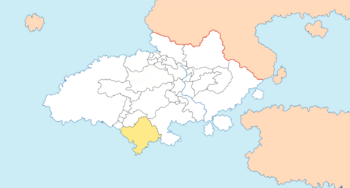Macklenover
Kingdom of Macklenover Königreich Macklennover (Alemannisch) | |
|---|---|
 | |
| Status | Consitituent state of Dolchland |
| Location | Macklenover within Dolchland. |
| Capital | Bertricht |
| Official languages | Alemannisch |
| Government | Federal parliamentary semi-constitutional monarchy |
• King | George IX |
• Prime Minister | Ruprecht von Mittelburg |
| Legislature | Estate at Bertricht |
| House of Lords | |
| House of the Estates | |
| Decleration as Kingdom 1819 | |
• Duchy of Macklenover | 1765 |
• Kingdom in Macklenover | 1796 |
• Kingdom of Macklenover | 1819 |
The Kingdom of Macklenover, commonly referred to as Macklenover, is a semi-independent constituent state of the Empire of Dolchland. It was established in 1797 during the War of the Habstrian Succession, and recognised in the Treaty of Morthal, giving it full independence from the Habstrian crown. Macklenover had long been a rebellious territory of the Habstrians. However, in 1765 King Leopold I of Habstria granted Duke Joesph II of Macklenover the title of King in Macklenover, though still under Habstrian rule, this gave them a lot more autonomy.
In 1795, the War of the Habstrian Succession broke out, with a majority of the Dolchic Kingdoms fighting against Habstria. The Habstrian King called Macklenover to his side, however the King of Macklenover refused to raise his armies. The Habstrian King took this as an act of treason and rebellion and sent his army to capture Bertricht and the Macklenoverian royal family. Upon hearing of this, the King in Macklenover took up residence in Enselhof Palace, and rallied his armies there. The Habstrian army, unable to capture the King, sacked Bertricht, destroying much of the old city, and executing nobles loyal to the Macklenoverian cause.
Realising that his army could not defeat the insurmountable force of the Habstrians, the Macklenoverian King decided to place his troops in the more capable and experienced hands of the Panedonians. Within six months all of Macklenover was liberated, and the Kingdom of Macklenover was declared in the King George Square in Bertricht, surrounded by buildings scorched by Habstrian troops.
Habstria recognised the independence of Macklenover in 1797 as a term of the Treaty of Morthal. The Panedonian King was insistant on the survival of an independent Macklenover. Not only would it weaken the Habstrians, but also provide a loyal and wealthy ally to Panedonia.
In 1865 King George V died at the age of 67 with no living children, forcing the government to search for a new King. George's sister, Sophia, was the consort of Transbaltia, and had four sons, though two of them had died shortly after being crowned as Grand Duke. This left two viable candidates, Grand Duke Wilhelm II of Transbaltia, and his younger brother Ernst, who had recently married Juliette de Bohun, the first cousin of Emperor George Alexander I of Delamaria. The government initially favoured offering the crown to Wilhelm, though the concept of a personal union, which Wilhelm already held with the Electorate of Runesburg, was unpopular among the court and several ministers. Therefore, the cabinet came to the decision to offer the crown to Ernst, who, within a month, was crowned King Ernst II, beginning the House of Matensburg's rule over Macklenover. After the birth of his first son George in 1870, it was decided that a new cadet branch of the Matensburg family would be formed. This was done to distinguish itself from the House of Matensburg-Meußen. The cadet branch was called the House of Matensburg-Bohun, in honour of Queen Juliette's house.

